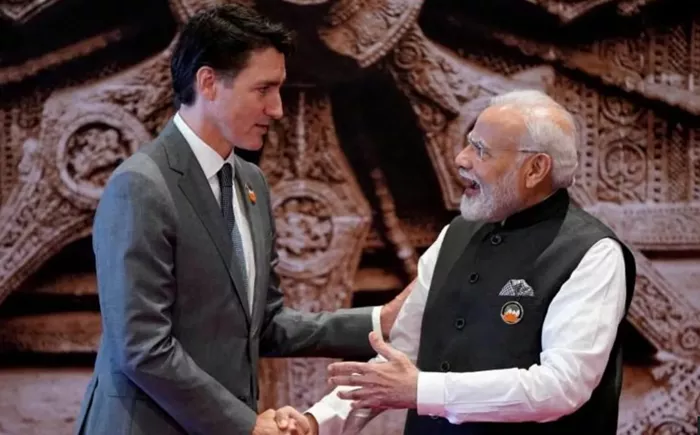Tensions Rise Between Canada and India Amid Serious Accusations.
This week, Canadian officials made serious accusations against the Indian government, claiming that its agents were involved in a campaign of murder and extortion. This has led to a significant decline in diplomatic relations between the two countries.
The growing rift raises concerns about its impact on the strong trade and immigration ties that exist between Canada and India. Bilateral trade between the nations is worth billions, and Canada is home to nearly 1.7 million people of Indian descent.
Experts say that the breakdown in relations is unprecedented and the next steps will depend on how both countries choose to move forward. So far, neither country has imposed tariffs or economic sanctions. However, experts warn that this could change, and a cooling relationship could slow economic growth.
“The biggest challenge for businesses and citizens is the uncertainty,” said Arif Lalani, a senior advisor at StrategyCorp and former Canadian diplomat, in an interview with the BBC.
For over a decade, Canada and India have been negotiating a trade agreement. However, Canada paused these talks last year shortly before Prime Minister Justin Trudeau publicly accused India of involvement in a murder.
In September 2023, Trudeau claimed that there were “credible allegations” connecting Indian agents to the murder of Sikh separatist Hardeep Singh Nijjar. Nijjar was shot and killed in Surrey, British Columbia, in June.
Following this accusation, India temporarily suspended visas for Canadian citizens, but this was a short-lived measure. Visa processing resumed in November.
Despite the diplomatic tensions, trade relations have continued as normal. Current bilateral trade stands at about $8 billion (£6.15 billion), according to India’s trade ministry.
Recently, Canada’s trade minister reassured business owners that the government does not intend to disrupt commercial ties with India. However, Lalani noted that due to ongoing uncertainty, businesspeople from both countries might start looking for opportunities elsewhere.
“People will think twice about expanding trade or building on existing relationships,” he said.
Another significant concern is how the diplomatic rift will affect the movement of people between the two nations. India has been the top source of international students in Canada since 2018, and approximately 4% of Canada’s population is of Indian origin.
“The human connection between our countries is profound,” said Karan Thukral, a lawyer in Delhi, adding that many of his clients are eager to move to Canada. He noted that many are now anxious about how the tensions might affect their plans to work or study there.
Thukral mentioned that immigration processing is still functioning, but he has advised clients to expect possible delays due to a reduction in diplomatic staff in both countries. Additionally, some Canadians with family in India worry about the potential for visa restrictions being reinstated.
Such restrictions could negatively impact business, trade, tourism, and investment, according to Jeff Nankivell, president of the Asia Pacific Foundation of Canada. “The Indian government has already shown it can suspend visa issuance, so it might do so again,” he said, adding that this would primarily affect Canada’s large Indian diaspora.
Nankivell believes the diplomatic situation will continue to evolve, and the fallout will likely be felt for a long time as Canadian authorities pursue legal action against those allegedly involved in Nijjar’s death and other criminal activities. “This will continue to raise tensions,” he noted.
In connection with Nijjar’s murder, four Indian nationals in their twenties have been arrested and charged, though it is unclear how they are connected to the Indian government. A trial date for these individuals has not been set.
Canadian police announced this week that they are conducting “multiple ongoing investigations” into the alleged involvement of Indian government agents in serious criminal activities in Canada.
On Wednesday, Trudeau reiterated his accusations against India, criticizing Delhi’s alleged aggressive interference in Canada’s sovereignty. However, he also stressed the importance of not harming economic and social ties.
“We don’t want to be in a conflict with a significant trading partner with whom we share deep ties and a long history,” Trudeau said during a public inquiry into foreign interference in Canada.
In response, India sharply criticized Trudeau, labeling his behavior as “cavalier” and claiming that Canada has not provided evidence to support its allegations. Earlier this week, India stated it “reserves the right to take further steps” in response to the situation, while Canada’s foreign minister, Mélanie Joly, said all options, including sanctions, remain on the table.
Related topics:
- How Has Employment Among Immigrants Changed Since the COVID-19 Pandemic?
- Denver plans to open a shelter near I-70 that will accommodate 20 immigrants each night.
- The Danger of False Information and Anti-Immigrant Language in Our Elections


